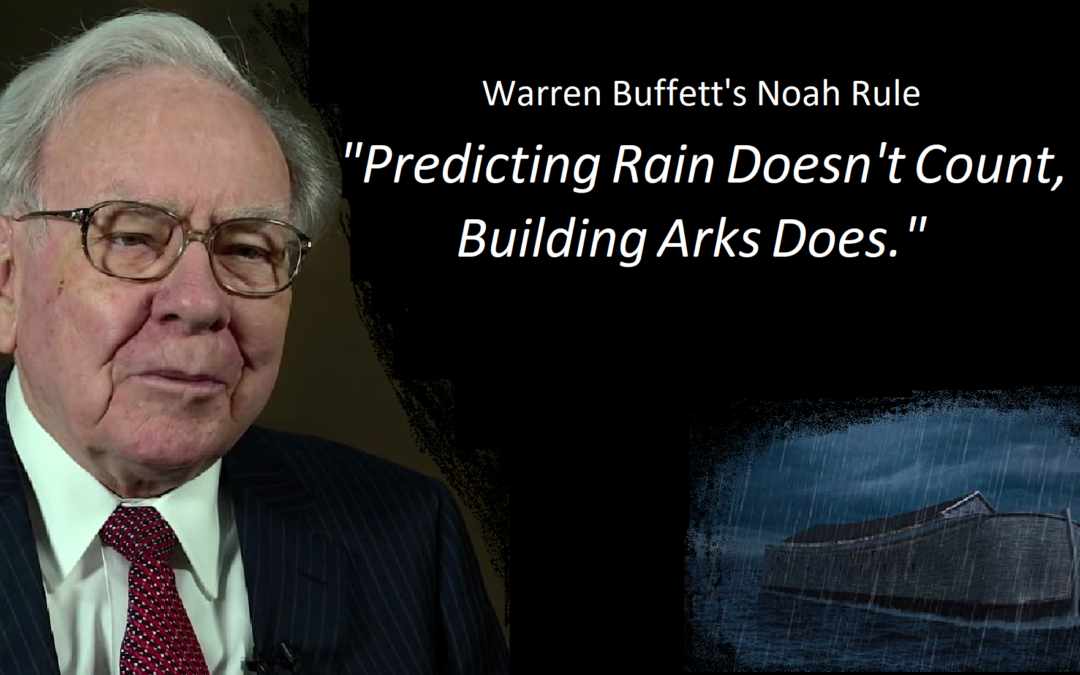This article is about Investment and Trading, however the principles behind Warren Buffett’s Noah Rule apply to people in all walks of life. From business and leadership, to personal relationships and career choices. — I hope you enjoy it and that in some small way it gives you cause to pause and think.
When Buffett Violated His Noah Rule.
Warren Buffett and his equally brilliant partner Charlie Munger, are known for their sage advice.
Their comments and quotes have achieved near legendary status across the investing and trading worlds.
One of Buffett’s lesser known quotes is his Noah rule: ‘Predicting Rain Doesn’t Count, Building Arks Does’.
Buffett’s Noah Rule deeply resonated me when I first heard it.
In those days I was still a trader, and I felt this quote eloquently emphasised a major part of my own personal challenge.
Buffett has only mentioned his Noah Rule once. It was in Berkshire Hathaway’s annual report for 2001.
2001 was one of Berkshire Hathaway’s worst years. Buffett stated that he had made mistakes that year: He had foreseen certain risks, but had not acted to minimise them.
Buffett stated that he hadn’t converted “thought into action” and as such “violated the Noah rule: Predicting rain doesn’t count; building arks does.”
Predicting Rain Doesn’t Count, Building Arks Does. — Buffett’s Noah Rule.
Predicting Rain Doesn’t Count
Back then I was a struggling trader. – When I say struggling, that is somewhat misleading. I was well into my third decade as a trader, but it had always felt like a struggle.
Trading is a constant fight, with that fight being as much with yourself as it is with the market.
I was always good at finding opportunities in the market. But it was always a struggle to monetise these effectively. This manifested itself in various different ways:
• Trying to perfect the entry (or exit).
• Waiting for a confirming factors, by which time the opportunity was mostly gone.
• Cautiously under-sizing the trade.
• Chickening out by grabbing profit too quickly.
• Trying to be cute: Putting on a spread of some sort, which watered the trade down. (The chicken hedge)
• Over analysing and then talking myself out of the trade.
• Getting in too early in too much size for ‘Fear of Missing Out’, only to actually miss out by being stopped out before the move happened.
• Tinkering and finessing too much so that by the end the trade was barely profitable.
I could go on with this list , but I am sure you get the picture.
The point was: I often foresaw the rain but was poor at building arks. And even when I did, I would not use them properly or effectively.
Buffett’s Noah Rule succinctly made explicit what for me had until then been largely implicit.
Trading is a constant fight: with that fight being as much with yourself as it is with the market.
Great Traders and Investors Build Arks.
Since 2009, I have been working as a coach.
In the coaching I engage in many deep and insightful conversations with traders and investors.
Amongst other things, the coaching explores how people work, how they relate to risk and uncertainty, and how their behaviours are influenced by their situation and working environment.
Violating the Noah Rule may not be a term people use, but the principle behind it crops up in many conversations.
Often people tell me they make outstanding calls but fail to monetise them properly or effectively.
This is one of the challenges of working in highly complex, volatile and uncertain environments.
The idea of building an ark, of creating a trading process and then adhering to it religiously may sound simple, but in practice it is extremely difficult.
Financial Markets represents a classic ‘Wicked Problem’.
Financial Markets represents a classic ‘Wicked Problem’. That is a problem which has innumerable causes, is tough to describe, and does not have a right answer.
One thing I’ve learned from my many coaching conversations, is that everyone makes errors and mistakes. – Even Warren Buffett and Charlie Munger screw up.
Nonetheless people do succeed in financial markets, and of those who succeed, some do it spectacularly. – Like Warren Buffett and Charlie Munger.
Process, Process, Process.
These are the 3 P’s of trading and investing which matter.
You can analyse the markets all you want, you can be the greatest predictor of market direction God ever put breath into, but without effective processes to monetise those calls, it counts for nothing.
Your ark is your own personal set of processes, practices, behaviours and attitudes which you construct to help you monetise the opportunities which the market offers.
Do you analyse and review your process?
How much energy goes into improving your process?
Do you even fully know your process, and its constituent parts?
Your processes are the most important part of your trading. Yet I would hazard a guess that it is the part which gets the least attention, and probably by quite some distance.
In trading and investment: It’s Not the Market You Conquer, it’s Yourself.
To be amongst that small group of winners who succeed overtime, you need to construct your ark, and you need to step into it.
That ark needs to be strong and robust but also adaptable and flexibility (Anti-Fragile as Naseem Taleb would call it).
It does not matter how much rain you predict, it will be meaningless if you do not have a strong ark, and do not use it when the time comes.

If you enjoyed this article:
You may enjoy some of our other articles which explores a range of themes related to human performance in Financial Markets. This includes, ‘It’s Not The Market You Overcome, It’s Yourself. and other posts on our Articles Page.
We are passionate about working with those who want to better themselves.
If you are curious about any aspect of our work, or would like to understand more about how coaching could help you or your business: Then please email me at steven.goldstein@alpharcubed.com.


